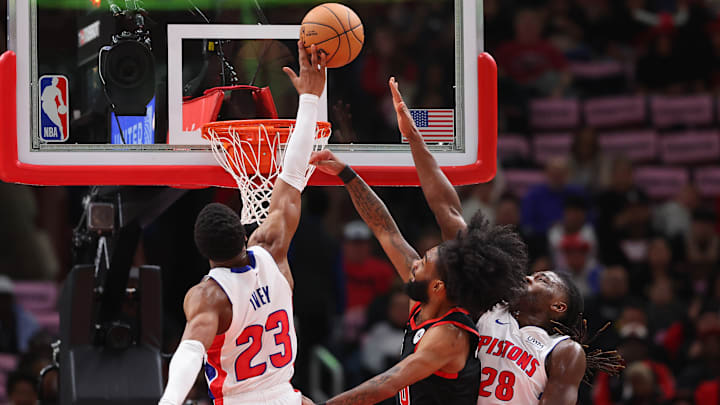We’ve talked a lot about Jaden Ivey’s offensive fit next to Cade Cunningham, but his fate with the Detroit Pistons may ultimately rest on his defense.
Ivey has already shown much of what he needed to on offense even though he only played 30 games last season. The Pistons still need more evidence, but Ivey was shooting over 45 percent on catch-and-shoot 3’s and looked like the secondary scorer the Pistons lacked in the playoffs.
We know Ivey can at least get buckets in flurries, make 3-point shots and attack as the secondary option, skills he should continue to improve upon next season.
The real questions are on the defensive end and whether a sub-par defender can ever be the right fit next to Cade Cunningham.
Jaden Ivey has to be better than a negative defender for the Pistons
On a recent episode of the Game Theory Podcast, host Sam Vecenie talked about the ideal type of player to put next to Cade Cunningham in the backcourt, and right now, he’s not sure it’s Jaden Ivey.
He said ideally that guy would be a good defender, which makes sense, as you don’t want Cade to constantly have to defend the other team’s best guard.
I tend to agree, though I also agree with the assertion that Ivey doesn’t have to be an elite defender to be that guy. He just has to be “neutral” or better.
The question is whether he can be, though we did see some improvement from Ivey in his brief time last season, at least in terms of effort and positioning, though the latter still needs work.
Ivey has never been asked to be a defender going back to his time at Purdue, but he does have some things going in his favor.
The first is having more continuity with a great defensive coach in JB Bickerstaff, who has a history of improving mediocre defenders by getting them to buy into his team concept. Ivey has the physical skills to be a good defender, so it’s really about being in the film room, working with his coaches and being better prepared mentally.
Ivey will also have the advantage of having Ausar Thompson next to him consistently for the first time in their careers. Thompson’s smothering defense will force bad passes that Ivey can intercept for steals, something he does well, and once Ivey gets it, he’s gone.
He’ll be able to feed off Thompson’s defense, which will give him some cover and also create opportunities for him to flash into passing lanes. Ivey averaged just under a steal per game last season, and I expect that number to go way up playing with Ausar.
The opportunity for defensive growth from Ivey is there, all he has to do is seize it, and if he continues his strides on the offensive end, the questions will finally be answered.
